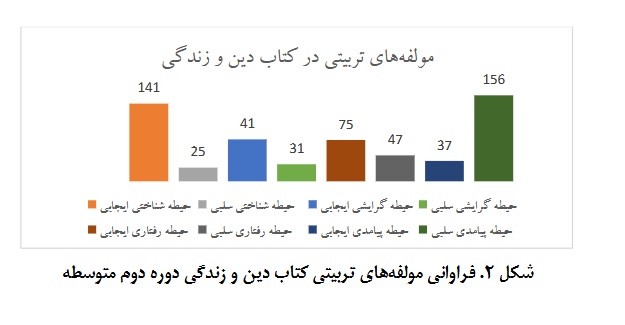Content Analysis of Secondary School Quran Education and Religious Studies Textbooks Based on the Educational Indicators of the Holy Quran
Keywords:
Quranic education, cognitive domain, attitude domain, behavioral domain, consequence domain, content analysisAbstract
This study aimed to analyze and evaluate the extent to which the content of Quran Education and Religious Studies textbooks in secondary school aligns with the educational indicators of the Holy Quran. The research employed a qualitative approach using descriptive content analysis. The population consisted of Quran Education textbooks (grades 7 to 9) and Religious Studies textbooks (grades 10 to 12). The unit of analysis was “theme,” and data were extracted and categorized according to the four Quranic educational domains (cognitive, affective, behavioral, and consequential). The results indicated that in Quran Education textbooks of lower secondary school, the consequential domain (164 cases) and cognitive domain (101 cases) were most frequently represented. In the Religious Studies textbooks of upper secondary school, the cognitive domain (144 cases) and consequential domain (133 cases) were predominant. In contrast, the affective and behavioral domains, despite their crucial role in adolescent religious identity formation, received considerably less attention. This imbalance in attention to different educational dimensions may lead to a gap between students’ knowledge, inner inclination, and practical behavior. The findings highlight the necessity of revising textbook content to strengthen affective and behavioral indicators and ensure balanced Quran-based education.
Downloads
References
Syafi'i Si, Shokheh M. The Role of Modernizing Islamic Religious Education and Character Building in Facing the Challenges of Juvenile Delinquency in the Digital Era. Al-Ulum Jurnal Pemikiran Dan Penelitian Ke Islaman. 2025;12(1):73-83. doi: 10.31102/alulum.12.1.2025.73-83.
Soeparwati, Ahmad Z, Sumarni S, Istiningsih I. The Grit Character Education Model Based on Islamic Values for Madrasah Ibtidaiyah Students: A Systematic Literature Review. Khazanah Pendidikan Islam. 2025;7(1):1-19. doi: 10.15575/kpi.v7i1.40255.
Rohim A, Madzaly MYA. Analysis of Evaluation Techniques in the Book "Islamic Religious Education and Ethics" for Eleventh Grade Students of Madrasah Aliyah. Edukasi Islami Jurnal Pendidikan Islam. 2025;14(01):67-86. doi: 10.30868/ei.v14i01.8054.
Pratiwi AY, Ihwan MB. Syawir Education Response to the Digital Era: Challenges and Opportunities to Use Maktabah Syamilah. Ijgie (International Journal of Graduate of Islamic Education). 2025;6(1):202-9. doi: 10.37567/ijgie.v6i1.3750.
Motahari M. An Introduction to Islamic Worldview. Majmou'e-ye Asar. 2. Tehran: Sadra Publications; 1995.
Motahari M. The Perfect Man. Qom: Sadra Publications; 1997.
Motahari M. Walas and Velayats. Qom: Sadra Publications; 2001.
Motahari M. Education and Training in Islam. Tehran: Sadra Publications; 2007.
Mesbah Yazdi MT. Guardianship: The continuation of the mission. 2012.
Abedi F, Monadi M, Khademi M, Kiamanesh A. Content analysis of the religious education textbooks of the secondary school period with emphasis on educational indicators in the national curriculum. Scientific-Research Quarterly of Education and Training. 2018;34(3):101-20.
Irandoost F, Jalaei M, Najafi Ivaki A. Content analysis of comprehension of Arabic text books in junior high school according to Barrett's classification. Studies on Arabic Language and Literature. 2021;11(31):23-50. doi: 10.22075/lasem.2021.20472.1238.
Zare Z, Imani M, Karimi Khoeigani R. An analytical-critical review of the dimensions of the value system of religious education for first-secondary students and its relationship with religious education and risky behaviors. Basirat va Tarbiyat-e Eslami Journal. 2022(61):125-48.
Bagheri K. A New Look at Islamic Education and Training. Tehran: Madreseh Publications; 2003.
Rafiei B. Views of Muslim Thinkers on Education and Training and Their Foundations. Tehran: SAMT Publications; 2000.
Seif AA. Modern Educational Psychology. Tehran: Dowran; 2008.
Sha'bani H. Educational and Training Skills. Tehran: SAMT; 2004.
Shoari Nejad AA. The Philosophy of Education. Tehran: Amirkabir Publications; 1991.
Ricciardelli LA, Nackerud L, Quinn AE, Sewell M, Casiano B. Social media use, attitudes, and knowledge among social work students: Ethical implications for the social work profession. Social Sciences & Humanities Open. 2020;2(1). doi: 10.1016/j.ssaho.2019.100008.
Livazović G. Role of family, peers and school in externalised adolescent risk behaviour. Hrvatska revija za rehabilitacijska istraživanja. 2017;53(Supplement):186-203.
Fel Araghi A, Azodolmolki S, Hosseini Mirsafi AA. Design and Validation of a Curriculum Model Based on Positive Education Approach in Iran's Secondary Education. Iranian Journal of Educational Sociology. 2024;7(1):179-88. doi: 10.61838/kman.ijes.7.1.17.
Bezi A, Fakoori H, Bayani AA, Saemi H. Design and Validation of an Environmental Education Curriculum Model for Higher Education Based on the "Aker" Approach. Iranian Journal of Educational Sociology. 2024;7(1):79-90. doi: 10.61838/kman.ijes.7.1.8.
Hernawati S, Hafizh M, Arya MNF. Adjusting the Ideal Islamic Religious Education Curriculum to the Development of AI-Based Technology. Progresiva Jurnal Pemikiran Dan Pendidikan Islam. 2024;13(01):129-44. doi: 10.22219/progresiva.v13i01.32931.
Suparta S. Religious Moderation-Based Curriculum for Urban Muslims: A Study in Islamic University of Indonesia Islamic Boarding School. Akademika Jurnal Pemikiran Islam. 2024;29(1):1. doi: 10.32332/akademika.v29i1.8732.
Nst AM. Curriculum Concepts and Theories From the Perspective of Islamic Education. Studi Multidisipliner Jurnal Kajian Keislaman. 2024;11(2):219-34. doi: 10.24952/multidisipliner.v11i2.13418.
Mehr Mohammadi M. A comparative study of curriculum planning systems in the Islamic Republic of Iran and the Federal Republic of Germany. 2004. p. 95-122.
Mehrmohammadi M. Curriculum: Perspectives, Approaches, and Outlooks. Tehran: SAMT; 2004.
Saroukhani B. Research Methods in Social Sciences. Tehran: Research Institute for Humanities and Cultural Studies; 2008.
Dehkhoda AA. Dehkhoda Dictionary. Tehran: Dehkhoda Dictionary Institute, University of Tehran; 1998.
Ornstein AC, Hunkins FP. Foundations, Principles, and Issues in Curriculum. Tehran: Islamic Azad University, Science and Research Branch Publications; 2005.
Maleki H. Curriculum Planning (Action Guide). Tehran: Payam-e Andisheh; 2005.
Group of W. The Philosophy of Education and Training. Qom: Hawzah and University Cooperation Office; 2005.
Gall MD, Borg WR, Gall JP. Quantitative and Qualitative Research Methods in Educational Sciences and Psychology. Tehran: SAMT and Shahid Beheshti University Publications; 2004.

Downloads
Published
Submitted
Revised
Accepted
Issue
Section
License
Copyright (c) 2025 Mahmood Shirzad (Author); Mehryar Shababi Shababi (Corresponding author); Maryam Haji Abdulbaqi (Author)

This work is licensed under a Creative Commons Attribution-NonCommercial 4.0 International License.










